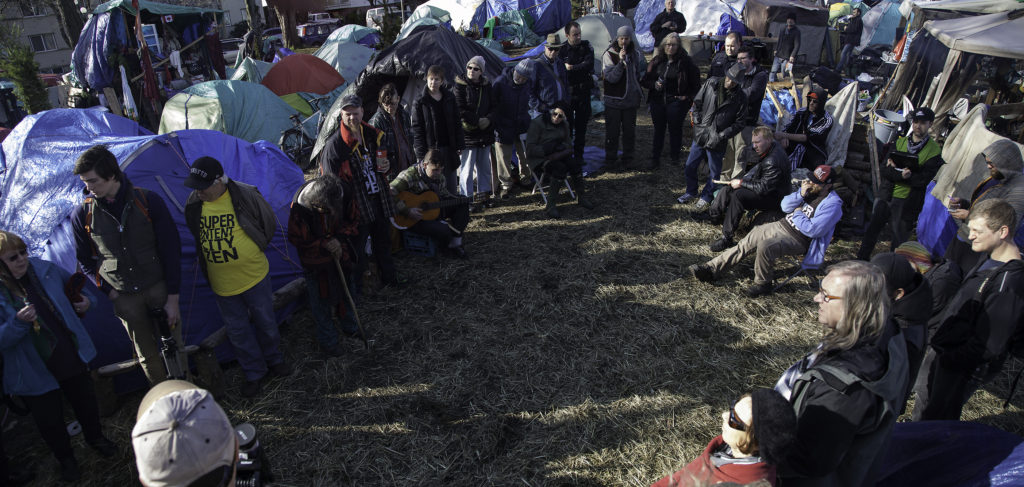
On Eviction Day, Super InTent City Releases Collective Housing Demands

*Thanks to those who contributed their opinions for this submission and who wish to remain anonymous. Pseudonyms used below.
This Monday, August 8th marked the court ordered eviction day of Super Intent City, the tent city on Victoria’s courthouse lawn. After almost 10 months of survival, community building, and political action, many will move on to permanent, supportive housing, the hard won victory of tent city. And while this version of SIC may be coming to an end, the fight for housing justice is not.
A room with 4 walls is welcome to those who have been without a home and on housing waitlists for many years. Many welcome the change of being indoors and out of the public eye, away from bylaw and police profiling and harassment. Those who continue to resist institutional, supportive housing or who did not make it on the list for housing will likely be forced back into the parks and doorways of the city.
People who have moved into the new facility run by Portland Hotel Society are signing month-to-month residential tenancy agreements for a $375 room with a bed, toilet, and sink (there are shared gender neutral showers for each floor) and report standard elements of institutionalized housing including cameras, visitor restriction, resident check-ins, no bathroom doors in rooms, and inconsistent and changing rules. According to resident, Big E: “They are making rules as they go. First they said we were allowed to have visitors. Now they are going back on that and saying it’s 30 days until we can have visitors. And then there is going to be a time limit, then you gotta let them know if someone’s gonna stay overnight, and in a month there are only so many days they can stay.”
Residents are currently forming a council in an effort to aid communication and have a say in decisions and daily housing operations. According to Lugan, “Everyone else has a say in where they’re going to live. It’s for our own safety. I don’t even wanna be here if I’m not going to be heard. It’s my community and I want input into it.”
As a legacy of SIC, residents have released their collective demands for housing
to guide housing activism going forward. These demands are a result of almost 10 months of meetings to reach consensus on key elements of housing for low-income people, including the need for an increased stock of affordable housing at welfare rates, the need for resident self-determination and control over their own housing, permanent homes and not temporary shelters, processes of accountability for housing providers, and no policing or surveillance in housing. The demands also describe elements of safe and decent housing that should be as available to people with low incomes as people with higher incomes, such as sufficient privacy and living space (including private bathrooms), proper maintenance of buildings, being able to have guests and family visit, being able to have companion animals, and being treated with respect by housing staff.
Efforts to create better supportive housing do not come at the expense of the larger goal to create resident-controlled social housing. Lugan continues, “I will show them how to run a place. Better than any government can do, where everyone’s input is the same and everyone is equal.” The fight for housing justice continues.
